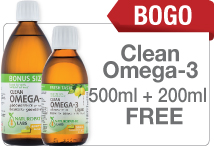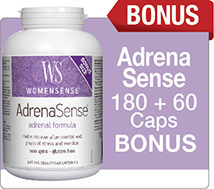Macular Degeneration
Updated Oct. 13th, 2017
The best time to start taking care of your eyes is before a problem even starts. While the progressive loss of vision from the degeneration of the macula does not usually appear until after age forty, the damage to the eye actually begins long before. It begins slowly as damage to individual cells, which after time affects tissues on a larger scale, ultimately resulting in the advanced vision impairment characteristic of this disorder.
The earlier you begin intervening against this damage with antioxidants, the better.
Macular degeneration is the leading cause of visual loss in North America. It is caused by free radical damage to the macula, the area of the retina responsible for central vision. Blurring in the centre of the visual field eventually makes detail work and reading impossible. The periphery of the visual field remains unaltered. Thus a kind of reverse tunnel vision results.
Macular degeneration is caused by free radical damage and tends to occur as we age; hence it is often called “age-related macular degeneration” or AMD. Free radicals are unstable molecules that in their bid to become more stable must bump into healthy cells and cause damage. Unhealthy food, poor quality water, toxins, and ultraviolet radiation from the sun are the major contributors of free radicals that build up in the eye. Other contributors to macular degeneration are hypertension and arteriosclerosis, both of which can restrict blood flow to the macula.
What results are two different types of macular degeneration. The first and most common type consists of free radical damage to the light sensitive cells of the macula. The second less common type occurs when blood vessels of the eye become fragile and break largely due to free radical damage, but also because of an increase in pressure against the blood vessel wall from hardening of the arteries and high blood pressure. The blood flow crucial to maintaining the health of the macula is then reduced. Both result in the same loss of sight in the centre of the eye’s field of vision and can affect only one eye or both eyes at once. People can have on or the other type of AMD, or in fact a combination of the two together.
Free radical damage to light receptor sites of the macula can be slowed and even stopped completely with the right nutritional supplements. The most important supplement to use for reducing the oxidative damage to these cells is the carotenoid lutein.
Derived in a supplemental form from marigold flowers and related to beta carotene, lutein has an affinity for the tissues that make up the macula. So, when you take lutein, it protects the macula specifically, while other antioxidants, although useful, are used throughout the whole body.
An analogy that researchers often use to describe this effect is that it is similar to applying a high SPF suntan lotion to your skin to prevent sunburn. A second carotenoid, zeaxanthin, also has a affinity for the macula of the eye and is often included in lutein supplements.
You should also take some or all of the following antioxidants, as they have been proven to reduce free radical damage to the eye as well: vitamin C, vitamin E, selenium, zinc, NAC, and Beta Carotene. For specific dosages, please see the list below.
Blood vessel fragility can be reduced with the right nutritional supplements - in fact, the small delicate vessels leading to the eye can be strengthened. Bilberry, the European relative to the North American blueberry, contains active components called anthocyanosides, a type of bioflavanoid. Anthocyanosides strengthen the collagen that lines blood vessels, thus increasing their elasticity. Bilberry also helps to reduce the free radical damage to which these small blood vessels are particularly sensitive. Ginkgo, grape seed extract and hawthorn can also provide support for the small blood vessels of the eye. These antioxidant herbs also contain similar bioflavanoids that can have a synergistic, or a greater effect when combined all together. Moderate doses can be taken for prevention, and higher, therapeutic doses can be taken as part of a treatment protocol for AMD.
Cleansing and detoxification should be included as part of your fight against macular degeneration as toxins that accumulate in the body cause increased exposure to free radicals. Liver cleansing is especially important as this organ is responsible for detoxifying and breaking down toxins. Consider milk thistle, alpha lipoic acid, the amino acid NAC, and dandelion to support liver function. NAC is particularly useful, especially against free radicals from pollutions, cigarette smoke, and alcohol. It is also useful for removing heavy metals from the body and supporting vascular cleansing which are both beneficial when dealing with AMD.
There are other external factors that have an affect on the development of AMD. To prevent AMD avoid direct sunlight - use sunglasses, with full UV protection, to protect your eyes. Smoking and drinking coffee or alcohol generate large amounts of free radicals and are thought to be risk factors for degenerative eye conditions. Chelation therapy helps to reverse AMD by increasing circulation through a cleansing of the arteries.
A diet high in antioxidants including whole grains, raw fruits and raw vegetables decreases free radical damage. Eat foods containing lutein and zeaxanthin like broccoli, collards, kale, mustard greens, spinach and turnip greens. Eat foods rich in flavinoids and vitamins C and E like blueberries, blackberries, cherries, and other fruits and vegetables. Yellow fruits and vegetables should be consumed for their vitamin A content. Drink lots of filtered water. Avoid chlorinated and fluoridated water.
Support the cardiovascular system to decrease arteriosclerosis and prevent hypertension. Maintain a healthy weight. Eat lots of fresh fruit and vegetables. Avoid salt, sugar and animal fats. Consume foods that are high in vitamin E, like avocados and wheat germ, to protect the vessels. Essential fatty acids also help with AMD by decreasing cholesterol levels. Try using flax seed, walnut or pumpkin seed oil.






















